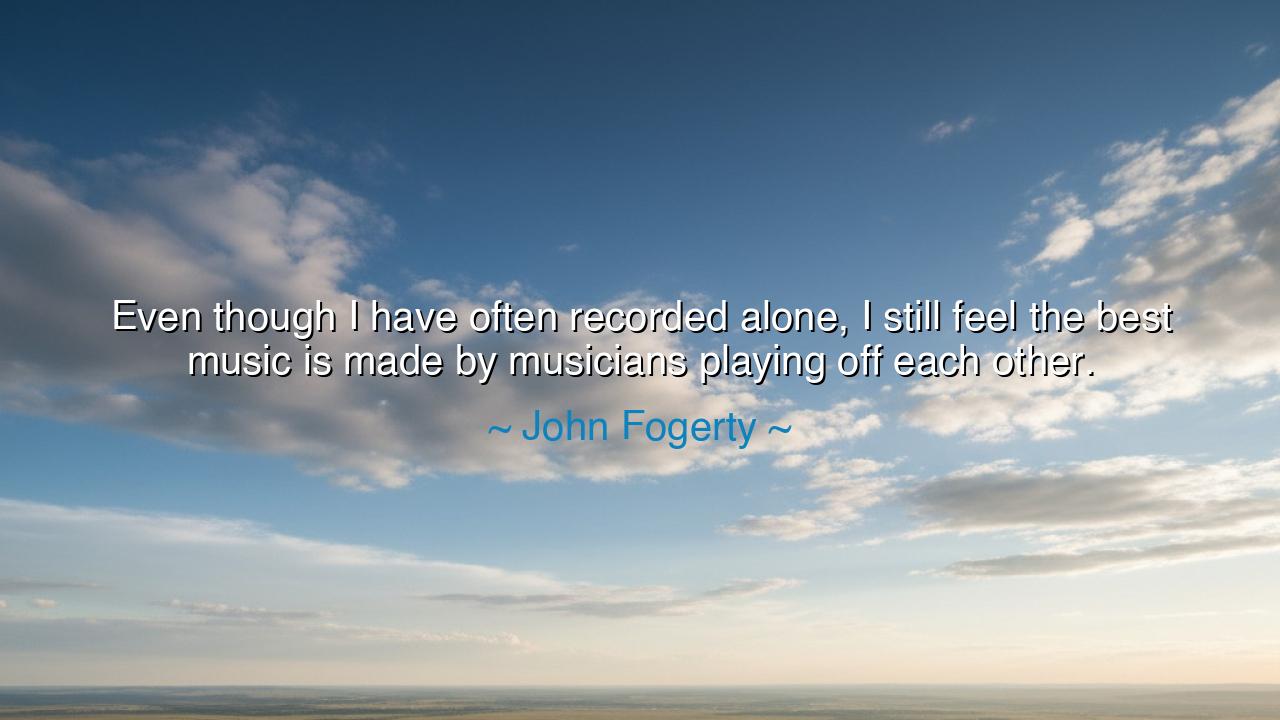
Even though I have often recorded alone, I still feel the best
Even though I have often recorded alone, I still feel the best music is made by musicians playing off each other.






“Even though I have often recorded alone, I still feel the best music is made by musicians playing off each other.” — Thus spoke John Fogerty, the fierce and soulful voice behind Creedence Clearwater Revival, a man who carved melodies that have thundered through generations. His words carry not only the wisdom of an artist but the eternal truth of creation itself: that though greatness can spring from solitude, the deepest and most vibrant expressions of the human spirit are born in connection. For Fogerty, as for all who truly understand the craft, music is not merely sound — it is communion, the invisible dialogue between hearts and hands, between souls that speak without speech.
The origin of this quote lies in Fogerty’s long and storied journey as both a solo artist and the leader of a band that once defined an era. In the early years, Creedence Clearwater Revival was a storm of unity and discord — bound by shared purpose, yet often strained by conflict. Later, Fogerty recorded alone, crafting songs layer by layer, each instrument played by his own hand. Though the results were powerful, he came to recognize that something ineffable was missing — that spark born only when musicians play off each other, responding in real time to the pulse of another soul. This insight is not merely about music — it is about the human condition, for even the most brilliant voice sounds richer when it is joined by others.
The ancients would have understood this well. The Greeks spoke of harmonia, the divine balance of opposites — a unity born not from sameness, but from difference. A lyre, they said, makes beauty not from a single string, but from the tension and interplay of many. In the same way, Fogerty’s words remind us that life itself is a kind of music: its harmony arises when our individuality meets the rhythm of others. To create alone is noble; to create together is transcendent. Just as the sea needs the wind to stir it, so does the musician need another’s note to awaken the fullness of his own.
Consider the tale of Miles Davis, the jazz visionary whose genius lay not in domination, but in collaboration. Davis once said that the magic of jazz was found “in the space between the notes” — in the energy exchanged between players who listened, felt, and responded to each other’s improvisations. His bands were laboratories of trust and risk, where silence could be as powerful as sound. Each musician brought a distinct fire, and together they forged something greater than any one of them could create alone. This is the essence of Fogerty’s truth: when artists play off each other, they become mirrors reflecting light in endless patterns — the individual dissolves, and the collective becomes eternal.
Yet Fogerty’s words also hold a lesson for our age of isolation, when technology tempts us to create, to work, even to live, apart. We can record, write, and build in solitude — and indeed, solitude can purify and strengthen the soul. But there comes a limit, a point where the echo of one’s own mind becomes too familiar, too narrow. The creative spark thrives in the friction of encounter — the glance of another, the challenge of disagreement, the inspiration drawn from shared struggle. To play alone is safe; to play with others is to risk imperfection — and yet it is within that imperfection that beauty breathes.
In a deeper sense, Fogerty speaks not only of music but of community. The best “music” of human life — whether in families, friendships, or nations — is created when individuals listen to one another, adapt, and respond. A society of isolated voices may produce noise, but it cannot produce harmony. True collaboration requires humility: to set aside ego, to leave space for another’s melody, to find strength in the weave of differences. This is the highest art of all — the art of belonging.
Therefore, let this be the lesson: seek solitude to know yourself, but seek others to know truth. In every endeavor — art, work, or love — remember that the finest creations arise not from domination, but from interplay. Surround yourself with those whose rhythms challenge and elevate you. Listen as much as you speak. Strive not to be the loudest instrument, but to play in tune with the symphony around you.
For as John Fogerty teaches, even the lone artist knows that the best music is made together. The soul may sing alone, but it finds its fullest voice in harmony with others. Life itself is this great performance — a song written in many hands, played on many strings, made sacred by the exchange of spirit. So play your part with courage, with humility, and above all, with love. For when hearts play off each other, the music becomes eternal.






AAdministratorAdministrator
Welcome, honored guests. Please leave a comment, we will respond soon